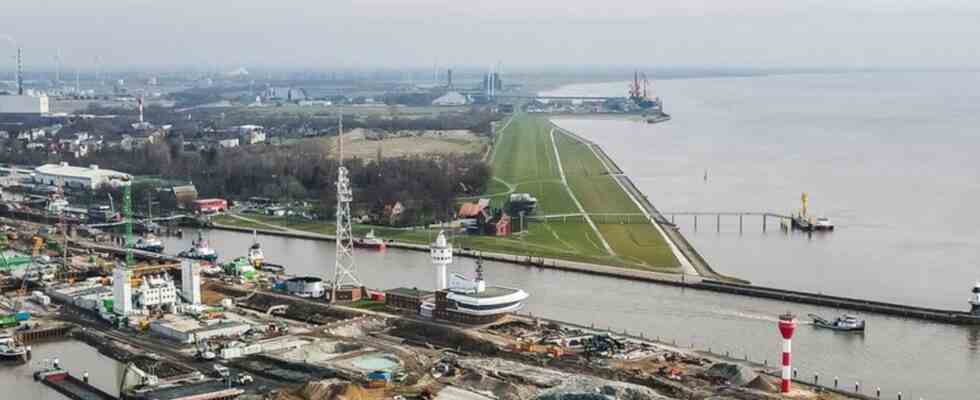energy
Liquid gas terminal for Brunsbüttel
The port in Brunsbüttel on the North Sea is under discussion as a location for a new LNG terminal. Photo: Frank Molter/dpa
© dpa-infocom GmbH
There have been plans for a liquid gas terminal in Germany for a long time, but they seemed to be making slow progress. Now there is a threat of a slump in supplies from Russia, and suddenly everything is happening very quickly.
The signal is clear: the federal government has a 50 percent stake in the first operating company for a German terminal for importing liquefied natural gas (LNG).
It is necessary to “reduce dependency on Russian imports as soon as possible; At the latest, Russia’s war of aggression against Ukraine makes this mandatory,” Economics Minister Robert Habeck (Greens) was quoted as saying in a statement from his house on Saturday.
Accordingly, the project partners of the LNG terminal in Brunsbüttel, Schleswig-Holstein, signed a “Memorandum of Understanding” on Friday. The agreement stipulates that the federal government will hold 50 percent via the KfW development bank, the Dutch gas network operator Gasunie, which belongs to the Dutch state, will hold 40 percent, and the remaining 10 percent will be held by the German energy group RWE. Gasunie will be the operator.
Capacity for eight billion cubic meters
Initially, the plan is to regas eight billion cubic meters of LNG a year in Brunsbüttel – i.e. to turn the liquefied gas, which can be transported by ship, back into gaseous form. This makes it possible “to obtain natural gas for the German market from regions that cannot be reached by gas pipelines,” the ministry said. Lower Saxony’s Prime Minister Stephan Weil (SPD) recently estimated: “All in all, one can assume that LNG could replace up to two thirds of the current natural gas imports from Russia.”
Almost a week ago, Chancellor Olaf Scholz (SPD) announced the rapid construction of two LNG terminals in Germany in response to the Ukraine war and dependence on Russian natural gas, naming Brunsbüttel and Wilhelmshaven as locations.
In the future, however, the terminal in Brunsbüttel is to be converted for the import of green hydrogen derivatives such as ammonia, as the ministry announced. KfW emphasized that the terminal is “a pioneer on the way to a climate-neutral energy industry”. Environmentalists are critical of LNG because using gas would delay the achievement of climate targets.
Commissioning will take time
The Federal Ministry does not give a specific time frame for completion, but promises to implement the project “as quickly as possible”. Schleswig-Holstein’s Prime Minister Daniel Günther (CDU) said on Saturday that he expected construction to take about three years. His Economics Minister Bernd Buchholz (FDP), on the other hand, estimated the construction phase at four to five years. Both welcomed the recent agreement.
What is certain is that there is still a long way to go before the first liquid gas delivery in Brunsbüttel. The project could be delayed, for example, by lawsuits from environmental groups. Legal steps could be initiated by the German Environmental Aid, for example. She had already made it clear in 2019 that she does not consider the project to be approvable as the location of an “accident operation” – i.e. an operation in which large quantities of dangerous substances are present.
The project sponsor of the Brunsbüttel terminal is German LNG Terminal GmbH. So far, it has also been worn by the tank storage specialist Vopak from the Netherlands and Oiltanking GmbH, a subsidiary of Hamburg-based Marquard & Bahls AG. Both will leave the group of shareholders by May 2022 at the latest, as German LNG announced on Saturday: “The previous shareholders came to the unanimous conclusion that Gasunie is the best partner for the federal government.”
On Saturday, RWE emphasized above all the importance of the subsequent conversion to hydrogen. For the energy company, “an important focus is on the later conversion of the terminal, which should enable the import of green molecules.”
The mayor of the city of Brunsbüttel, Martin Schmedtje, also welcomed the declaration of intent. It shows confidence in the location. “Under different circumstances, I would have been very happy,” he said, referring to the war in Ukraine, which was one of the reasons for the quick decision.

